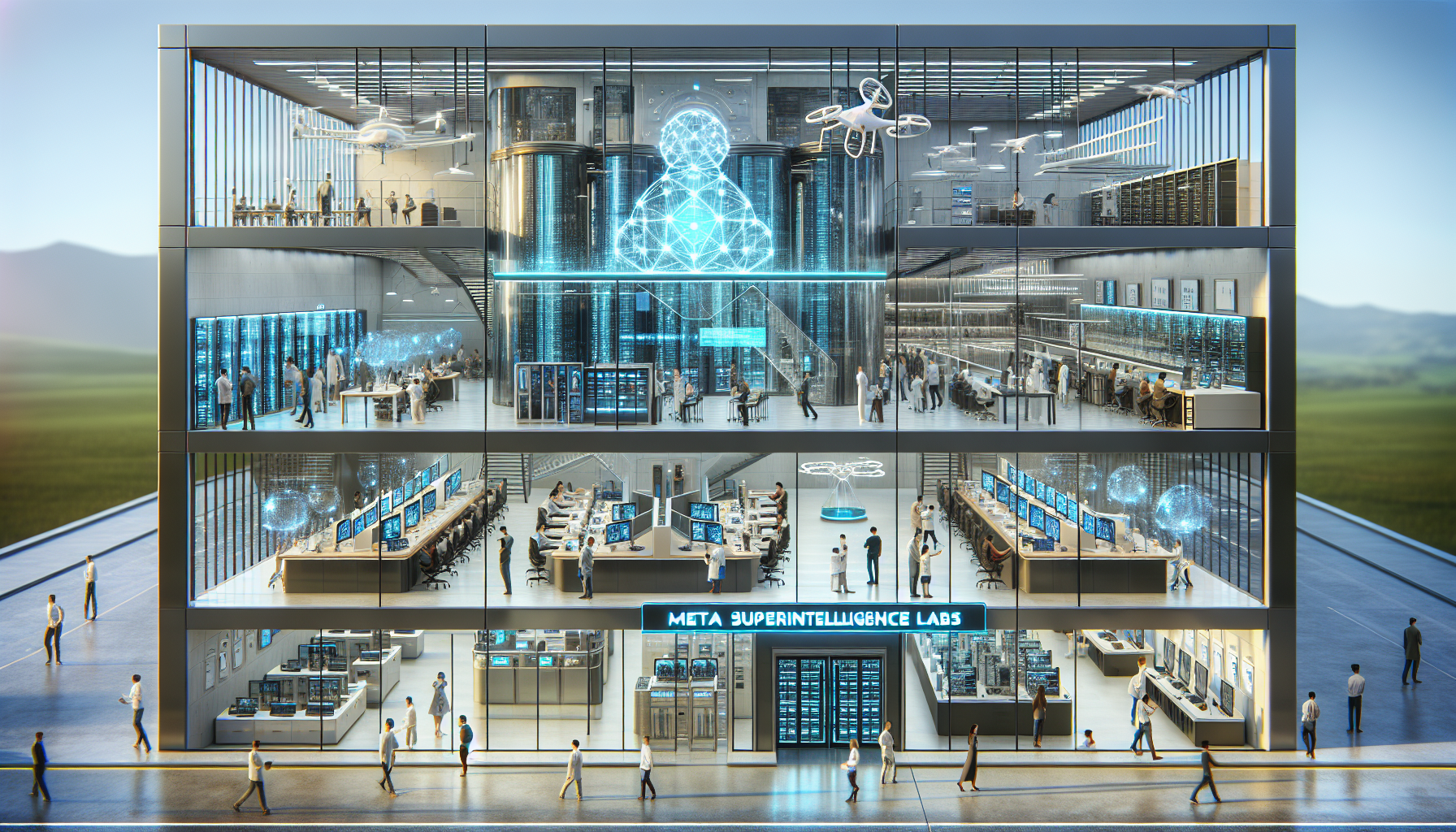The Hidden Truth About the AI Talent War: Meta’s Game-Changing Strategy
Inside Meta’s $15 Billion Superintelligence Labs: The Battle for AI Talent in Silicon Valley
Artificial intelligence is no longer just a promising field—it’s the frontline of a ruthless technology competition reshaping the very fabric of Silicon Valley. At the eye of this storm lies the Meta Superintelligence Labs, a $15 billion mega-project spearheaded by Mark Zuckerberg that is more than just a pivot away from the costly metaverse experiment. It’s a bold gambit in the escalating AI talent war, a high-stakes game where the prize is nothing less than supremacy in the future of technology.
—
How the AI Talent War is Reshaping Silicon Valley—And Why Meta Superintelligence Labs is Leading the Charge
Silicon Valley’s landscape is being fundamentally altered by the fierce competition over artificial intelligence expertise. The stakes have never been higher: AI developers today hold the keys to transformative innovation, market dominance, and multi-billion-dollar valuations.
– A Cutthroat Arena: Tech giants such as Google, OpenAI, and Amazon are locked in an intense battle to snatch up the finest minds in machine learning, natural language processing, and reinforcement learning. Simultaneously, nimble startups scramble to innovate before being swallowed or outpaced.
– Meta’s Role: Meta Superintelligence Labs has emerged as a pivotal player through an aggressive, well-funded strategy to corner AI talent. Unlike earlier projects that diluted focus—like the $46 billion spend on the metaverse—this lab concentrates resources on groundbreaking AI, signaling Zuckerberg’s realization that AI is the real battleground.
– Immediate Industry Ripples: The race is pushing salaries to unprecedented heights and forcing companies to reconsider their talent acquisition and retention strategies. Startups are caught in a squeeze between selling too early or burning cash to compete with nine-figure offers from giants like Meta.
Meta’s leadership in the AI talent war is reshaping not only its own corporate future but the broader dynamics of Silicon Valley’s technology competition.
—
Mark Zuckerberg’s Transformational Investment in Meta Superintelligence Labs: Betting Big on AI Talent
Mark Zuckerberg’s strategic pivot from the metaverse to the Meta Superintelligence Labs marks a seismic shift in the company’s long-term vision and investment priorities.
The Metaverse Fallout and New Focus
– After investing approximately US$46 billion in metaverse-related development—an effort criticized for lack of immediate ROI—Zuckerberg recalibrated.
– The creation of Meta Superintelligence Labs is not just a shift; it’s an acknowledgement that genuine technological breakthroughs will come from AI, not virtual reality fantasies.
Attracting and Keeping World-Class Talent
– Meta has redesigned its internal culture and compensation packages around attracting top AI researchers who are usually courted by other elite firms or startups.
– The Labs offer nine-figure compensation packages, unheard of even in Silicon Valley, signaling an arms race in talent acquisition.
– This is also a strategic message: Meta isn’t just trying to participate in AI innovation; it is determined to lead by creating a powerhouse that can outpace rivals.
Meta’s Superintelligence Labs exemplify how Zuckerberg’s vision has matured—from a sprawling technology conglomerate dabbling in diverse ventures to a focused AI juggernaut aiming to control the future of the field.
—
AI Development Landscape: Shifting from Open-Source to Proprietary Models at Meta Superintelligence Labs
One of the most profound, and controversial, shifts in AI development is Meta’s move away from the traditionally collaborative, open-source model toward proprietary frameworks under the Superintelligence Labs banner.
Why the Shift Matters
– Historically, many AI breakthroughs benefited from open-source contributions, enabling rapid innovation and distributed knowledge-sharing.
– Meta’s new approach favors internalizing research efforts, protecting IP, and building proprietary AI models that give them a competitive edge in Silicon Valley’s technology competition.
– This shift impacts:
– Collaboration: Reduced open collaboration could slow wider community progress but speed up internal innovation cycles.
– Competition: Other firms may follow suit, potentially fragmenting the field into secretive silos guarded by massive budgets.
Strategic Implications
– The Labs’ approach intends to leverage massive computing infrastructure and scale — Meta’s Hyperion supercomputing project is set to power models at an unprecedented 5 gigawatts scale.
– This shift signals Meta’s ambition to build AI systems that are not only powerful but closely held assets, essential in outmaneuvering rivals.
While this transition has raised eyebrows, it underscores the lengths to which Meta is willing to go to ensure it stays at the forefront of AI development.
—
Unpacking Talent Acquisition Strategies at Meta Superintelligence Labs: The Nine-Figure Compensation Packages
The AI talent war is being fought not only through cutting-edge research but also through staggering financial incentives that redefine compensation benchmarks.
Breaking Down Meta’s Recruitment Playbook
– Meta is reportedly dishing out nine-figure compensation packages—including salary, bonuses, stock options, and benefits—to lure elite AI researchers, data scientists, and engineers.
– Recruitment efforts span from freshly minted PhDs to industry veterans, and the Labs have heavily targeted talent from rival companies and promising startups.
– This escalation is pressuring the entire AI sector to match or risk losing human capital to Meta’s deep pockets.
Industry-Wide Consequences
– Compensation inflation may trigger unsustainable salary growth, pressuring startups and smaller players who cannot compete financially.
– The push for exclusivity might stifle open innovation, as talent is locked behind competitive compensation and proprietary workflows.
– It raises questions about the long-term sustainability of such investments and their impact on the overall AI ecosystem.
Meta’s approach clearly signals that success in AI is increasingly defined by the ability to attract and retain the human brainpower behind the breakthroughs.
—
Future of AI Development: Predictions for Meta Superintelligence Labs in the Broader Technology Competition
Looking ahead, the Meta Superintelligence Labs are poised to become a defining node in the future AI landscape, with far-reaching implications.
Potential Trajectories
– Dominance in AI research: With massive capital and talent, Meta could set standards in AI capabilities, shaping everything from automated reasoning to generalized AI.
– Industry Standard Shifts: If proprietary models succeed, the industry might see a bifurcation—open-source innovation slowdowns balanced by giant tech labs sprinting ahead.
– Challenges: Meta must navigate ethical concerns, regulatory scrutiny, and the risk of innovation bottlenecks.
– Balancing ambition with responsibility will be critical to sustaining competitive advantage without alienating public trust.
Opportunities for Meta and Silicon Valley
– Greater investments in AI could drive new applications in healthcare, communications, and augmented intelligence.
– Meta’s leadership might encourage other companies to invest aggressively, sparking a virtuous cycle of innovation.
Despite risks, Zuckerberg’s gamble on Meta Superintelligence Labs could rewrite the playbook of AI development and Silicon Valley’s tech competition over the next decade.
—
Summarizing the Impact of Meta Superintelligence Labs on the AI Industry and the Silicon Valley Talent War
To recap, Meta’s $15 billion bet on its Superintelligence Labs represents a transformative moment in Silicon Valley’s technology competition:
– The Labs have become the epicenter of the AI talent war, using jaw-dropping compensation and strategic pivots to assemble an unmatched research team.
– This shift from open-source to proprietary AI development models signals a new phase in industry dynamics, where collaboration gives way to guarded innovation.
– Zuckerberg’s investment reflects a fundamental reevaluation of priorities post-metaverse, placing AI at the heart of Meta’s—and Silicon Valley’s—future.
– The consequences extend beyond Meta, reshaping compensation standards, innovation ecosystems, and competitive strategies across the board.
Actionable Takeaways:
1. For startups: Prepare to innovate rapidly or partner strategically, as competition for AI talent intensifies beyond traditional boundaries.
2. For AI researchers: Expect compensation and opportunities to soar—but also consider ethical and collaborative implications.
3. For investors: Watch how Meta’s focused AI strategy could redefine market leaders and influence investment flows in technology.
4. For policymakers: Anticipate challenges around proprietary AI models and talent monopolization that may require new regulatory thinking.
Meta’s Superintelligence Labs are not just a corporate project—they are a clear signal of a new era in AI, where billions fuel an even bigger battle for the minds shaping our technological future.
—
For more insight into Meta’s AI strategy and talent acquisition dynamics, explore our related article: Meta CEO Mark Zuckerberg is making significant investments in AI with the creation of Meta Superintelligence Labs, reflecting a shift in strategy following the costly metaverse venture.
—
References:
– \”Meta Superintelligence AI Lab and Zuckerberg’s Talent War,\” Artificial Intelligence News, https://www.artificialintelligence-news.com/news/meta-superintelligence-ai-lab-zuckerberg-talent-war/



